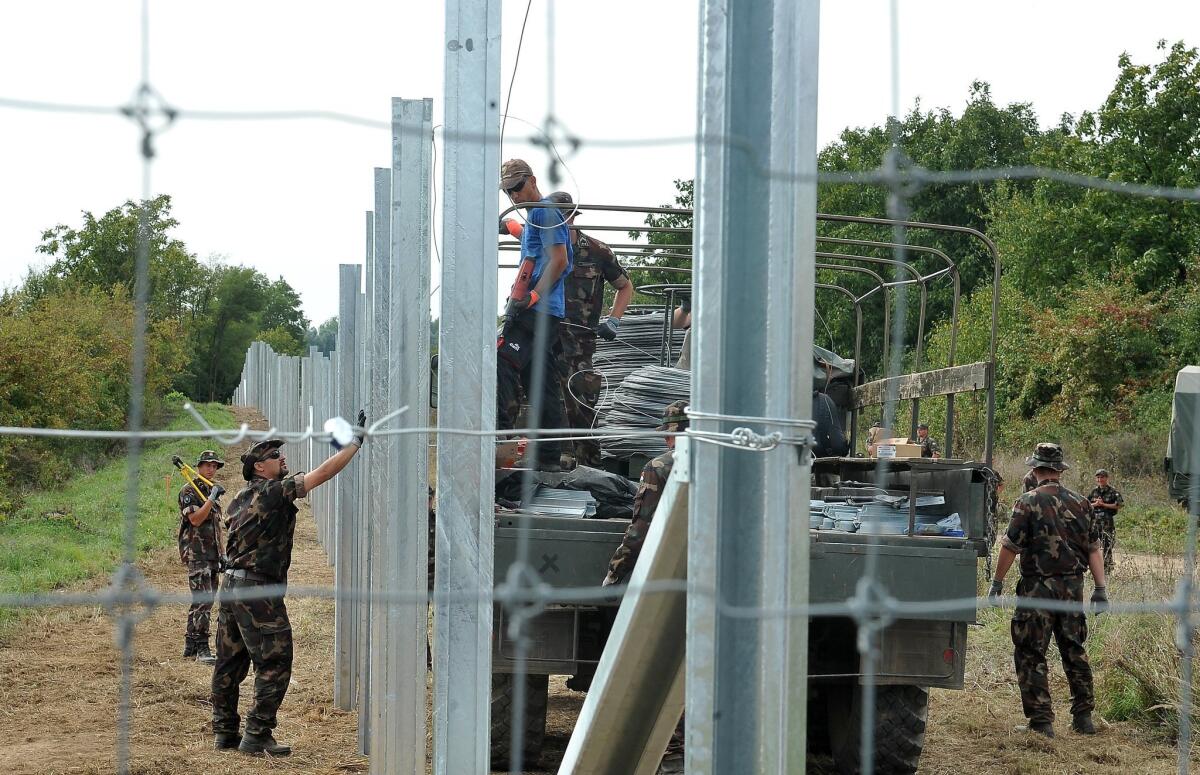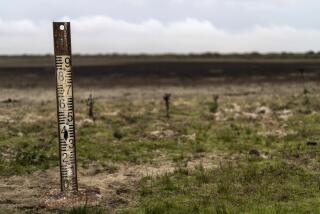Amid some dissent, European ministers OK resettling 120,000 refugees

Hungarian soldiers raise fences at the border with Croatia on Sept. 22.
Reporting from London — Over the strong objections of some, government ministers from the European Union voted Tuesday to resettle 120,000 refugees, distributing them across the continent but making only a small dent in Europe’s huge migrant crisis.
The decision came through an extremely rare majority vote, rather than a full consensus, of the interior ministers from the EU’s 28 member states, attesting to the deep divisions over the issue.
Dissenting were several former Soviet bloc countries: Hungary, the Czech Republic, Romania and Slovakia. Finland abstained. But under EU rules, the objecting nations must comply with the plan to accept refugees, who will be distributed according to each country’s population and wealth. The bulk will be taken in by Germany, France and Spain.
The overall number represents only a small portion of the nearly half a million migrants who have poured into Europe this year from war-torn and poverty-stricken countries in the Middle East, Asia and Africa. Germany has already pledged to accept up to 800,000 asylum seekers.
Yet even the relatively low EU commitment met with fierce resistance from the countries that voted against the plan. That forced the ministers gathered in Brussels to resort to a vote, a departure from the usual practice of decisions by consensus that analysts say raises serious questions about the future of the European Union and its goal of greater integration.
“We would’ve preferred to have adoption by consensus, but we did not manage to achieve that. But it was not for want of trying,” said Jean Asselborn, the foreign and European affairs minister from Luxembourg, which currently holds the rotating EU presidency.
“We are in an emergency situation,” Asselborn added. “The EU is accused of not moving quickly enough in its decisions, so we had to adopt this legal decision today on the relocation of 120,000 people.... If we had not done this, Europe would have been even more divided, and its credibility would have been even more undermined.”
Dimitris Avramopoulos, the EU’s commissioner for migration and home affairs, was more blunt, calling the migration crisis “an existential issue for Europe.”
“It will be a test whether Europe can really manage … this very challenging issue,” he said before Tuesday’s conclave. “It is a moment for everybody to show that we really mean it when we talk about responsibility and solidarity.”
Asselborn said pointedly that he expected all countries, including the objectors, to abide by the decision, as expected under the rules of EU membership. The Slovakian prime minister was reported to have declared after the meeting that his country would refuse to participate in the resettlement plan.
Hungary, which has sealed some of its borders with razor wire to keep asylum seekers out, said it would comply.
“This is a decision we are going to respect and we are going to fulfill,” Zoltan Kovacs, a government spokesman, told the BBC.
Skeptics had said that there would be no way to force refugees to remain in their assigned countries given the free, passport-less movement of people throughout much of the continent. Many of the migrants coursing through Europe – thousands more of whom arrived in Greece on Tuesday – have expressed a clear preference to live in the wealthier, friendlier countries of Germany and Scandinavia.
The agreement allows for refugees to be tracked by their host countries and for their benefits and legal rights to be curtailed if they move to another EU nation.
Last week, the ministers agreed on a previous proposal to distribute 40,000 refugees. Tuesday’s decision would raise the total to 160,000.
The aim is to relieve the burden on front-line member states, such as Greece and Italy, that have borne the brunt of the influx of migrants arriving by sea.
The new plan is expected to be ratified Wednesday at an emergency summit of the leaders of all 28 EU countries. The meeting will also address how to better secure the EU’s external borders and how to help Syria’s neighbors such as Turkey and Lebanon, which have taken in vastly more refugees than has Europe.
For news from Europe, follow @HenryHChu
More to Read
Sign up for Essential California
The most important California stories and recommendations in your inbox every morning.
You may occasionally receive promotional content from the Los Angeles Times.











